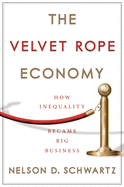
New York Times business reporter Nelson D. Schwartz's deceptively breezy The Velvet Rope Economy offers an all-inclusive VIP survey of one ever-widening American gulf: the divide between the first-class, fast-pass, pay-for-comfort experiences of a wealthy elite, and the slow, soiling reality shared by us suckers in steerage.
Schwartz guides readers into the worlds of high-end cruise packages, exclusive airport terminals, luxury ballpark suites and line-jumping amusement park tickets, illuminating the history, challenges and economic logic of the booming business of catering to those eager to pay a premium price for a friction-free life. Schwartz favors vivid anecdotes and thumbnail accounts of entrepreneurs' lightbulb moments--he captures the a-ha! that led to solo drivers paying to cruise in carpool lanes. But The Velvet Rope Economy grows more outraged as the pages pass, arguing that the highest cost of all comes when a society's ballin' class utterly removes itself from the conditions shared by the general population--or investment in a common good. In his study's second half, Schwartz ducks under his velvet rope to consider the rise of Dollar General and Dollar Tree, both the perfect opposite of Diamond Medallion Status, and the crumbling of institutions like hospitals, public schools and fire departments. (He also introduces well-heeled homeowners who enjoy access to private firefighting teams, of course.)
Despite the bleakness of income inequality, Schwartz is persuasive when he offers up hopeful contrasts, such as some inspired nonprofits or the success of egalitarian businesses like Southwest Airlines, whose recent troubles don't detract from his thesis. --Alan Scherstuhl, freelance writer and editor

